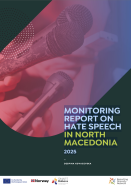MONITORING REPORT ON HATE SPEECH IN NORTH MACEDONIA 2025
November 10, 2025
During the monitoring period from January 1, 2024, to June 30, 2025 (18 months), we recorded a total of 138 incidents of hate speech. Some of these incidents were assigned to multiple categories, reflecting the complexity and overlap of different forms of hate speech. Of all recorded hate-speech incidents, 31.8% were directed at people based on their ethnicity. The second most common target was political or ideological opponents with 25.2%, followed by gender, which represented 19.9% of the incidents.
This pattern is largely influenced by the presidential and parliamentary elections that were held in the period of May-April 2024 and the upcoming local elections in October. Alongside the interplay of ethnic dynamics and the polarisation between Albanian and Macedonian parties, which has led to an increase in interethnic hate speech.
When it comes to the type of hateful and discriminatory discourse, almost half of the recorded cases (41.2%) contained insults, including personal, denigrating, and humiliating language. This was followed by negative group labeling, stereotyping, and expressions of hostility, accounting for 20.9% of cases.
Inflammatory speech (such as content related to conflict situations, repeated messages from different actors, or prolonged coverage by the same media) accounted for 11.3%, while incitement to violence represented 10.7%, sharing the third place among types of hate speech.
Half (52.7%) of the main generators of hate speech during this monitoring period were private individuals. Politicians, state officials and political parties ranked second at 16.0%, followed by journalists at 14.0%. Influencers and bloggers accounted for 8.7% reflecting the lack of regulation of influencers in the country. The amount of hate speech coming from private individuals is alarming. This often occurs through the sharing of media content using sensationalistic headlines, or simply by reposting issues, where the accompanying comments themselves are hateful. This opens the discussion on the importance of moderating comments on online media platforms.

Download MONITORING REPORT ON HATE SPEECH IN NORTH MACEDONIA 2025
Download In Macedonian: MONITORING REPORT ON HATE SPEECH IN NORTH MACEDONIA 2025
Download In Albanian: MONITORING REPORT ON HATE SPEECH IN NORTH MACEDONIA 2025
